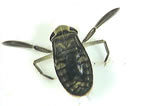| |
Adults of the Nematomorpha, which means "thread-form", are thin, cylindrical, wiry worms that can reach lenghs of 100-700 mm. The adults are non-feeding, with blunt, extremely reduced heads (above) that may lack a mouth opening.
The microscopic larvae are internal parasites of insect hosts such a crickets, grasshoppers, and some terrestrial and aquatic beetles. Their bodies are somewhat grub-like, with a retractable structure that resembles a hooked spear. Shortly after hatching, larvae form a cyst near the water's edge on weeds and other objects. When ingested by an unsuspecting host, they grow as parasites inside the insect until they mature and burst out of their host when it is again near water.
Adult Nematomorpha are typically found in still waters, including stream margins and pools, and the males may swim clumsily. They sometimes show up in cisterns, often upsetting the owners or users, but they are harmless; their presence merely indicates the presence of other insects around the cistern.
As many as 20 adult horsehair worms may intertwine themselves into a writhing mass, a tendency that earned them their other common name of "gordian worms", harkening back to the intricate Gordian knot of Greek mythology. Adults may be up to 700 mm long (over 2 feet!), with females generally larger than males. |
|
Size:
xlarge
Identifying feature(s): very long, tough, unsegmented, worm-like animals that are sometimes found in writhing masses
Habitat: wetlands; shallows of ponds, lakes, rivers and streams.
Tolerance: moderate
|

